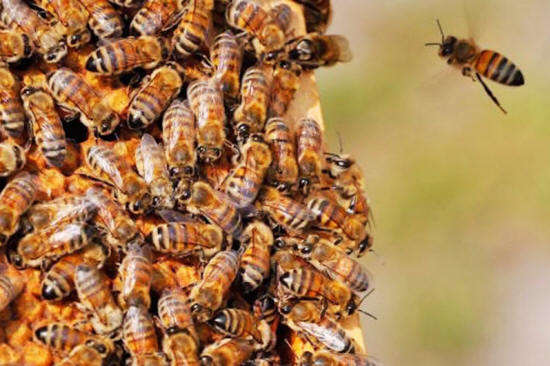|

by Phillip Schneider
May 18, 2018
from
WakingTimes Website

In light of growing scientific evidence linking certain insecticides
known as
neonicotinoid insecticides or neonics to rapidly
collapsing
bee populations, the European Union voted to place a permanent ban
on virtually all use of these bee-killing toxins.
The decision to vote on the ban came shortly after the European
Food Safety Authority announced that after conducting a major
review of more than 1,500 studies relating to neonicotinoids, the
council had decided that the pesticides,
-
clothianidin
-
imidacloprid
-
thiamethoxam,
...all pose a significant
risk to wild bees and honeybees.
Under the new law, the three main neonics cited in the study will
only be allowed in "permanent greenhouses" away from any possible
contact with wild or domestic bees.
The rules
are set to take effect around the end of the year and build on
current restrictions from 2013.
"Most uses of
neonicotinoid pesticides represent a risk to wild bees and
honeybees, according to assessments published today by EFSA.
The Authority
has updated its risk assessments of three neonicotinoids -
clothianidin, imidacloprid and thiamethoxam - that are currently
subject to
restrictions in the EU because of the threat they pose to
bees."
European Food Safety Authority
Although their
conclusions vary depending on the type of bee and form of exposure,
the EFSA states that the insecticides pose a clear "overall" risk to
wild and domestic bee populations.
Wild bees such as
bumblebees were also taken into account in the study, however the
largest available information was on honeybees.
"Bees can be
exposed to neonicotinoids in multiple ways, depending on the use
of the pesticide.
The assessment indicated that in many cases
bees foraging on the treated crop in the field as well as in its
vicinity are likely to be exposed to harmful levels of the neonicotinoid pesticides."
EFSA
Although the ban
has been widely well-received, some are wondering how farmers will
manage without these pesticides to fall back on.
Sandra Bell,
bee campaigner for Friends of the Earth Europe argues that
the ban will encourage independence from the use of harmful
chemicals and pesticides.
"Many farmers
are already successfully growing crops without neonicotinoids.
But too many other damaging chemicals and practices are still
used.
Farmers need
more support from the European Commission and national
governments to farm with nature - not against it."
Sandra Bell
Having campaigned
for years to end the use of these pesticides, environmental activist
groups are touting the ban as a "groundbreaking" and "historic" win,
while hoping that it will inspire other countries to begin
restricting the use of bee-killing pesticides as well.
Vytenis
Andriukaitis, a European Councilman who voted in favor of the bill,
tweets his approval of the new ban for protecting biodiversity and
the environment in Europe.
Critics of neonics
are also wondering how their movement will be affected by Trump's
current administration and EPA, which has tended to side with
businesses rather than environmental protections.
"The EU's
wisdom highlights the Trump EPA's folly.
Although U.S.
beekeepers reported catastrophic losses again this winter, and
just in this past week the EPA closed a comment period on
another suite of damning neonicotinoid risk assessments, rather
than banning these dangerous pesticides, the agency is actually
considering increasing the use of neonics across another
165 million acres."
Lori Ann Burd
director of the
Center for Biological Diversity's Environmental Health Program
Regardless of what
is happening in America, Europe is now seeing what Lori calls a
"science-based regulation of pesticides" which will likely cause a
ripple effect throughout much of the world.
| 

